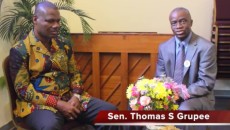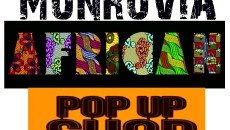Long before the declaration of our independence in 1847, the freedom of our forebears to dictate their own political and economic destiny was under hostage. For 25 unbroken years, the sovereignty and self-governance of a land, which would later be known as Liberia, was determined by an international non-governmental organization called the American Colonization Society.
After several years of hard labor and inhumane treatment in the United States, the chain of slavery was finally untied from the hands and legs of black slaves. In 1822, a new territory in Africa called Liberia was founded by the ACS to accommodate freed black slaves. I can imagine how tough it was for these settlers to safely sail onto a ‘dark’ continent like Africa. Even though it was difficult traveling long distances, nothing could easily bend their determination from seeking refuge in a new home where freedom was accessible.
On February 6, 1821, the first batch of 88 immigrants left New York and harbored in Liberia. This was a new beginning of establishing a young nation. Upon the arrival of these settlers, they met indigenous occupants on ground with unique cultural pattern and values. Americo-Liberians were gently given an olive branch by original owners of this soil at the time. As a result of indigenous’ kindness and generosity, Americo-Liberians had breathing space to co-exist on Providence Island.
After few months, the interest of these strangers grew larger. Their quest for expansion became a priority. They had no intention of uniting with those they met on ground. Instead, colonists thought it was a good idea to promote disunity and disintegration by subjecting the natives to unjust and inhuman treatments.
Internal bickering and power struggle became the order of the day. There were series of wars between the colonists and indigenes. This was a bitter start for Liberia. I think if the two parties (both natives and settlers) would have cordially cultivated unity from the very beginning, our country would have been a better society. Regrettably, deep division characterized the formation of Africa’s first independent republic.
From 1821 to 1847, Liberians were indirectly ruled by foreigners. From the colonial to the commonwealth era, the determination of self-governance was invisible. The British and French also took advantage of a conflict-ridden settlement by encroaching on our land. Delegates from various colonies were ready to embrace an independent status after two and the half decades of external control and threats. Their readiness was uncompromising.
A new and lonely nation in Africa was finally given birth to at an official constitutional convention held in 1847. There were 12 delegates from Montserrado, Sinoe, and Grand Bassa, who subsequently adopted the declaration of independence and constitution on July 16, 1847. Â At long last, on July 26, 1847, a young African American man from Virginia named Joseph Jenkins Roberts declared the colony of Liberia an independent republic. The Lone Star rose above Africa as an inspiration to other colonized territories. Our country became known worldwide from that moment. Many saw us as a symbol of hope and a shining star of democratic radiation in Africa.
I am left to wonder why Long Peter, Sao Boso, and other native Kings didn’t participate in this crucial convention even though they were an integral part of the society. It is left with you to answer this question. Despite the situation, there were unique promises made during independence. Those promises are still loud in our ears and can never be forgotten. The promise of self-determination, security, freedom, peace, unity, equality, dignity, justice, and civil liberty were guaranteed in one voice by the founders and forefathers of this state.
After 169 years of existence, the question that seems too hard to answer in some quarters is “HAS OUR INDEPENDENCE MET ITS PROMISE?â€Â I want to emphatically say, NO! The promise of Liberia’s independence is still lingering in the wilderness of uncertainty.
After more than a century of political endurance, where is the democratic inclusion? Where is the equality? Where is the economic freedom? Where is the justice? Where is the unity? Where is the patriotism? Where are all these good promises?
Our past and present as a nation clearly show the lack of political will to uphold and defend these fundamental promises of our independence.
The significance of preserving our sovereignty goes beyond everyone’s interest and imagination. Over time, most citizens have lost appetite to celebrate Liberia’s birth anniversary simply because they believe that it is worthless to be happy in the midst of poverty and hardship.
Independence Day is meant to revive national courage and restore broken hopes. Â Independence renews good memories of economic, political, and social transformation. Independence means for everyone regardless of your status to have access to basic social services. It also means to equitably distribute national resources. Other countries around the world are eager to celebrate their independence because the promises of their independence are still intact.
Recently, Americans happily observed their independence because the promises of America yesterday are still upheld today.  Due to the conducive political and economic environment existing in Ghana, there was a nationwide independence celebration on March 6 of this year. I saw smiles on the faces of Ghanaians. They had sufficient reasons to commemorate such a special day. Their flag was high up in the sky projecting an emblem of a progressive and inclusive society.
How can Liberia boast of being 169 years old when most of its citizens are subjected to economic deprivation, marginalization, and destitution? How can we brag about being the trendsetter of independence in Africa, when our economy is on the verge of collapse?
Why aren’t we growing along with our age? This is a big shame to Africa’s first independent republic. Even though we have an abundance of natural resources with a very small population, our country remains one of the poorest on earth.
I refuse to accept that this sweet land of liberty is cursed!
The country’s greatest problem has been its leaders. Most politicians in Liberia care less about improving the living standard of ordinary people. They go the extra mile to achieve their selfish political ambitions and enrich themselves through ill-transparent practices. They lack the integrity to protect the constitution which guarantees the inalienable rights of all citizens.
It is very unfortunate for our leaders today to forget the promise of self-determination. Patriots like Hilary Johnson and J. J. Roberts made sacrifices to secure the status of nationhood for Liberia. The destiny of the oppressed majority is still imprisoned by members of the elite class. This country belongs to all Liberians; as such, divisiveness and class system must come to an end.
The principle of egalitarianism is an unparalleled catalyst of national healing and reconciliation. Everyone must be given a fair chance to chart their own course politically, socially, and economically. Realities in the recent past and now suggest that our country has not aspired to the level of self-determination. What a promise betrayed!
When our sitting President said in her first inaugural address that she looks forward to seeing Liberia becoming a success story of America, did the president really calculate the implications? For me, that was an understatement. When the story is written about how America through Firestone has and continues to exploit Liberia and its people for 89 years now, I wonder what will the president say.
The promise of security, peace, equality and freedom has been suppressed by elitists and imperialists. The society is still insecure. Without security, it is impossible to achieve economic growth and democratic sustainability. Due to a poor security sector, the criminal rate is on the rise. The rule of law is not taking root because some enforcers of the law are unaware of the law. The rights of impoverished citizens are mostly infringed upon by higher-ups.
I thought the framers of our constitution said everyone, regardless of social status, should have access to unlimited security and justice. Regrettably, the ‘rich and powerful’ continue to enjoy maximum security and justice at the expense of ordinary peasants. With the drawdown exercise of UNMIL, our nation stands at a serious security risk. I hope this government under Madam Sirleaf’s rule will mitigate this gap.
Though the objective of our founding fathers was to establish a country of peace and tranquility, after 169 years, peace amongst Liberians is invisible. Peace cannot come when one group of people are unfairly treated. Peace can only come when everybody has access to equal opportunities and privileges.
We fought a war in this country due to dissatisfaction and discontent. We had no reason to kill each other for 15 years. Sadly, we had to tread the path of civil unrest because certain individuals felt they were more citizens than others. Certain individuals felt that the presidency was a family inheritance. As a result of this, greedy politicians took advantage of the situation by infiltrating the ignorance and gullibility of our people.
Today, the blood of over 250,000 innocent Liberians who were victimized by this senseless crisis are crying out for justice. Our peace remains fragile as the symptoms of displeasure and public discontent continue to undermine national reconciliation. Reconciliation is possible, but through sincerity, honesty, justice, and transparency.
We cannot be preaching reconciliation while corruption in public service is evident. We cannot be preaching peace when our hydrocarbon resources are abused. We cannot promote togetherness when our educational system is messy.  We cannot sing the song of freedom when our health sector is poor.  We cannot preach unity when the gap of economic equality is very wide. If we are given the opportunity to freely and equally vote, we must also be given the opportunity to freely and equally share in our nation’s wealth.
We have achieved political freedom to some extent, but where is the economic freedom? Our current dilemma is more economical. Until we can fight to gain economic independence, our political situation will continue to shift downward. Liberia cannot get better when the hopes and aspirations of our independence are decaying.
This country is far from getting better when our young sisters are sexually enslaved and trafficked by foreigners. Â A just and equal society procreates peace and unity. The failure of politicians over the years to pledge their uncompromising loyalty and allegiance to Liberia has led to an uneven nation.
Noticeable indicators in Liberia have made most Liberians to lose taste about celebrating Liberia’s birthday. We know how they feel right now. We share in their sorrow, pain, and agony. We empathize with street children, widows, teachers, students, shoe-shine boys, wheelbarrow pushers, taxi-drivers, marketers, push-push riders, petit traders, car loaders, rock crushers, and all less-fortunate citizens who are in serious economic torment.   Don’t give up! Keep holding on! Change is on the way.
Why must Liberia be the seventh poorest country when its soils are blessed with abundant natural resources?  Liberia, according to Transparency International’s 2013 Barometer Report, was rated as the most corrupt country in the world, along with Mongolia.  Over 80 percent of Liberians live below the line of poverty, while 85 percent are unemployed. We have more than 16 billion direct foreign investments, but the living condition of our people is awkward.
Why must we celebrate independence when 66 out of 68 concession agreements did not meet the minimum standard of the public procurement and public financing laws? Liberia’s inflation rate is 7.30 percent while import rate stands at US$2.457 billion. I wonder where we stand with all these downward trends. There is nothing to celebrate because the hope of our independence is unseen in practical terms.
We call on all Liberians to peacefully protest on July 26 by boycotting all national programs around the country. 169 years is enough to transform our condition. Join us to fight against nepotism, corruption, patronage, injustice, and inequality.
Featured photo by Erik Hersman



